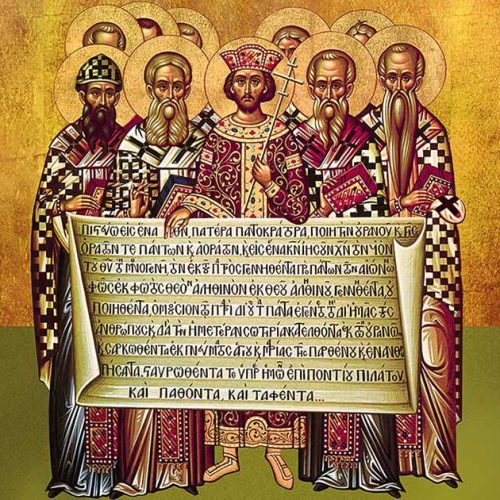As this year marks the 1,700th anniversary of the Nicene Creed, I want to recognize the validity & impact of this important statement of faith formulated in A.D. 325 at the First Council of Nicaea. Few milestones are as significant in the course of Christian history as this first great ecumenical council which has shaped Christianity ever since, as it summarizes key doctrines that all biblically orthodox Christians believe.
It’s the most widely accepted creed, & is used in Roman Catholic, Eastern Orthodox, Anglican, Lutheran, & most Protestant churches. Creeds have historically served as helpful tools for teaching sound doctrine & spotting false doctrine, especially in times when people either couldn’t read or didn’t have their own copies of the Scriptures. Creeds aren’t a replacement for the Bible’s authority, but can reinforce & distill its essential doctrines.
Constantine was a Roman Emperor who converted to Christianity, & finally legalized it. He called over 300 Church leaders (“bishops”) together from across the Christian world to Nicaea (Iznik in present-day Turkey) to bring unity not only to the Church but to his empire. But some conspiratorial critics peddle claims about Constantine manipulating this council & commissioning a new distorted Bible which only included writings that made Jesus divine, while suppressing & omitting other writings which emphasized His humanity.
Such speculative theories among anti-Christian or heretical scholars gained mainstream exposure a couple of decades ago with the popular fictional “DaVinci Code” book & movie by Dan Brown. But those assertions are not historically accurate at all. As pivotally important as this Council was, it didn’t determine the list of New Testament books, nor formally accept it. Instead, it affirmed that the New Testament books written in the 1st century A.D. by Christ’s apostles & prophets were already accepted as authoritative (Luke 1:1-4, 2 Pet. 1:16, 3:15-16). The heretical books written much later by forgers & false teachers in the 2nd & 3rd centuries were already rejected as fiction by Christian leaders. That virtually the entire Church came to recognize the same 27 books as authoritative shows incredible near unanimity.
The Council of Nicaea also reaffirmed Jesus as God. Constantine seems to have presided at the Council, & favored Christ’s divinity, but he didn’t write the Nicene Creed. The bishops who did write it adopted precise language that the majority of the Church believed then & now.
But critics will claim that Jesus wasn’t viewed as divine until the Council established Him as the Son of God by a close vote. Arius, an influential theologian, had argued for a small minority that Jesus was a created being, not God in the flesh. Arianism is still found today in so-called Christian groups that are actually cults. But the Council’s purpose wasn’t to debate if Jesus was God—it was to decide in what way He was God. The vote wasn’t even close—300 to 2 to confirm that He was coequal with the Father. Notes that were preserved from the Council are available to read in several books.
The Nicene Creed rejected & condemned Arianism to affirm the historic orthodox understanding of the Trinity, which was already believed—Jesus existed eternally as the Son of God with the Father, not as a created being. The New Testament teaches that God is a Trinity—3 persons in 1 God (1 divine being or essence). The creed was later expanded & refined in A.D. 381 at the Council of Constantinople, adding details about the Holy Spirit’s divinity, the Church, baptism, & the resurrection.
The Nicene Creed (in a common English translation) is as follows:
We believe in one God, the Father, the Almighty, maker of heaven and earth, of all that is, seen and unseen.
We believe in one Lord, Jesus Christ, the only Son of God, eternally begotten of the Father, God from God, Light from Light, true God from true God, begotten, not made, of one Being with the Father; through him all things were made.
For us and for our salvation he came down from heaven, was incarnate of the Holy Spirit and the Virgin Mary and became truly human.
For our sake he was crucified under Pontius Pilate; he suffered death and was buried.
On the third day he rose again in accordance with the Scriptures; he ascended into heaven and is seated at the right hand of the Father.
He will come again in glory to judge the living and the dead, and his kingdom will have no end.
We believe in the Holy Spirit, the Lord, the giver of life, who proceeds from the Father [and the Son], who with the Father and the Son is worshiped and glorified, who has spoken through the prophets.
We believe in one holy catholic [that is, universal] and apostolic Church.
We acknowledge one baptism for the forgiveness of sins.
We look for the resurrection of the dead, and the life of the world to come. Amen.
I add my amen to fully endorse these orthodox statements, which help to unify believers, transcending time, culture, & even denominational differences.


